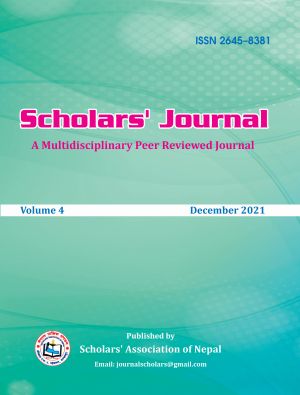Socio-culturally Embedded Vedic and Ethnoecological Knowledge: Decolonising Perspectives and Practices
DOI:
https://doi.org/10.3126/scholars.v4i1.42483Keywords:
Ethno-ecology, cultural science, ecological knowledge, spiritual practice, knowledge transformationAbstract
This study explored the Vedic and Ethno-ecological knowledge embedded within cultural practitioners, teachers and students. To obtain the objective of this explorative and decolonising study, I purposively selected two Ethno practitioners, two science teachers and four students. About 55 minutes focus group discussion was carried out with selected students and near about one-hour interview was carried out with Ethno practitioners and teachers. The collected information was transcribed and then translated into English and main themes were identified using the Rhizomatic approach by connecting the nodal point to identify main themes. Then each theme was analysed using the abductive approach to justify the participants' arguments. The finding indicates that Vedic and socio-cultural practice consisted of world peace and sustainable development ideas. Cultural students learned this knowledge by seeing their elders' day-to-day practice. Teachers are also seen aware of the effect of modernisation but show reluctance to implement it in school science teaching. Local as well as the central government could be serious to implement Vedic and Ethnocultural knowledge to preserve the earth as well as the whole universe. The Vedic and Ethno knowledge is seen fully supported for the decolonising western-based pedagogical practices.
Downloads
Downloads
Published
How to Cite
Issue
Section
License
Copyright (c) 2021 Kamal Prasad Koirala

This work is licensed under a Creative Commons Attribution-NonCommercial 4.0 International License.
Copyright © The Authors

